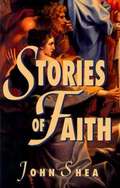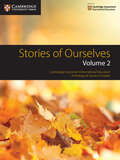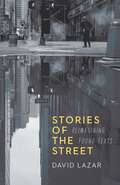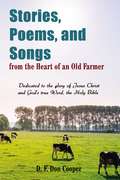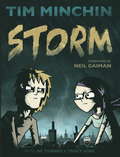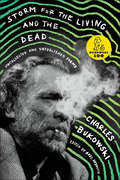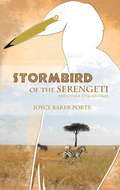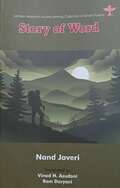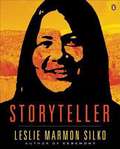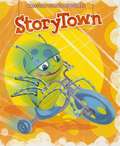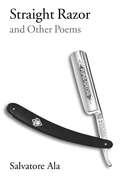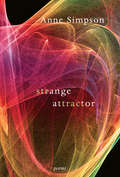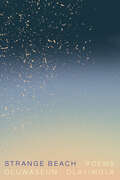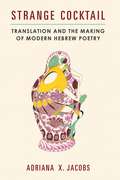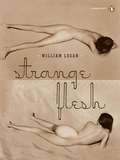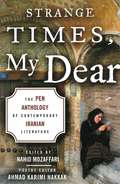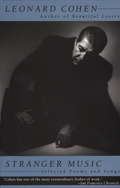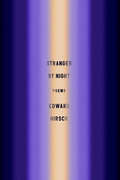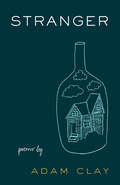- Table View
- List View
Stories of Faith
by John SheaThe book is spiritually deep, thought-provoking treatise on making Jesus' story our own. It includes sections of beautiful and meditative poetry. From the book introduction: This book is a meditation on the dual drives of Christian faith: toward God and toward Jesus. How do we get to God and, more importantly, how do we get back? How do we contact the vitality of Jesus that generated the Christian movement and what happens to us once contact is made? Faith has the reputation of being a chameleon word. Its meaning changes with the environment. But no matter what transformations occur, God and Jesus are the constant center.
Stories of Ourselves Volume 2: Cambridge Assessment International Education Anthology of Stories in English (Cambridge International Examinations)
by Mary WilmerThis series contains poetry and prose anthologies composed of writers from across the English-speaking world. Stories of Ourselves Volume 2 is a set text for Cambridge IGCSE®, O Level and International AS & A Level Literature in English courses. The anthology contains short stories written in English by authors from many different countries and cultures, including Charles Dickens, Virginia Woolf, Christina Rossetti, Janet Frame, Jhumpa Lahiri, Romesh Gunesekera, Segun Afolabi, Margaret Atwood and many others. Classic writers appear alongside new voices from around the world in a stimulating collection with broad appeal.
Stories of the Street: Reimagining Found Texts
by David LazarWhen walking down the street, it is not uncommon to see lost items that have escaped their proper receptacles, but how often does one stop to read the messages left behind? David Lazar has stopped often, capturing the pieces of a &“lost world on the streets&” and thinking about the life of the discarder from the fragments left behind.Stories of the Street is a series of imaginative meditations—through prose poems, short-short essays, microfictions, and prose pieces without precise genre distinction—of what it means to encounter lost or discarded texts. Rather than simply deconstructing the lists, notes, receipts, or book pages he finds strewn in various cities, Lazar uses them as suggestive, capable of inspiring possible narratives that are at most latent in the text itself. The encounter, then, is an encounter with oneself and the mysteries of cities, where detritus frequently doubles as a sign saying, &“Consider this.&” Lazar&’s narrative voice ranges in tone from the comically antic to the melancholy. By photographing what he describes as &“messages that had escaped their bottles&” on-location as found, Lazar has become a flaneur of paper debris, puzzling over the evidence of urban human life.
Stories, Poems, and Songs from the Heart of an Old Farmer: Dedicated to the glory of Jesus Christ and GodÆs true Word, the Holy Bible
by Don CooperThis book is a compilation of stories, poems, and song lyrics which really do come from the heart of a former dairy farmer who sincerely desires to share his love for Jesus and God's true Word, the Holy Bible, with you. It tells of our faith and experiences during our time as dairy farmers and how those two intertwined."Dedicated to glory of Jesus Christ and God&’s True Word, the Holy Bible" is Don's mission statement, and throughout all of his writings he tells how the Lord has been at his side throughout his whole life. Without His presence Don could have never done the seemingly impossible things he's done.
Storm
by Tim MinchinA storm is brewing in the confines of a London dinner party. Small talk quickly descends into a verbal and intellectual battle between science and belief, as comedian Tim goes head to head with the mysterious fifth guest at the table - a hippy named Storm.With stunning original artwork, Tim's sublime ranty beat-poem weaves through the world we live in, where alternative medicine is given credence and public funding, psychics have primetime TV exposure and people are happy with mystery rather than answers.While Storm herself may not be converted, audiences from London to Sydney have been won over by Tim's lyrical wonders and the timely message of the piece in a society where science is attacked as the enemy of belief. STORM is the illustrated book born from the acclaimed internet sensation - the animation that has become an anthem for critical thinking worldwide, attracting over three million views. Now fully reimagined, STORM is a masterpiece that sparkles with beauty, wit, reason and rationality.Watch the video here: http://bit.ly/1s2DUuU
Storm Against the Innocents: Holocaust Memories and Other Stories
by Elly GrossIn 1998 Elly Gross, née Berkovits saw a picture on a display in Poland that changed the direction of her life. This book would not have been written if Elly had not seen that picture. Other life-changing events included separation at the age of 15 from her mother and 5 year old brother and incarceration as an inmate and slave laborer at Auschwitz-II/Birkenau. She survived; her family was murdered. After liberation, she began a new family with a survivor of the Death March. In 1966, they fled from communist Romania to the United States. She, her husband, and two children worked hard to attain the American Dream. Then in 1998, she participated, for the first time, in the March of the Living, a program where teenagers and survivors visit Jewish sites in Poland and Israel. At Auschwitz-II/Birkenau, there was a picture of a group of woman and children, just off the cattle cars, whose lives were soon to be snuffed out. In that picture, Elly found her mother and brother. This "reunification" is the touchstone from which so much of Elly's poetry and narratives pour. The history she writes about, from the Holocaust to the attack on the World Trade Center, is horrific. Elly, the innocent child, saved through a series of miracles or accidents, becomes Elly, the survivor-adult. As her legacy, she shares the feelings and facts of the time period with her readers. Her writing is a memorial to her family, as well as a commitment against hatred and the destruction to which it leads. To read this book is a memorable and touching experience. There are moments described that the reader will not forget, because they are not meant ever to be forgotten.
Storm for the Living and the Dead: Uncollected and Unpublished Poems
by Charles BukowskiA timeless selection of some of Charles Bukowski’s best unpublished and uncollected poemsCharles Bukowski was a prolific writer who produced countless short stories, novels, and poems that have reached beyond their time and place to speak to generations of readers all over the world. Many of his poems remain little known, material that appeared in small magazines but was never collected, and a large number of them have yet to be published. In Storm for the Living and the Dead, Abel Debritto has curated the very finest of this material—poems from obscure, hard-to-find magazines, as well as from libraries and private collections all over the country—most of which will be new to Bukowski’s readers and some of which has never been seen before. In doing so, Debritto has captured the essence of Bukowski’s inimitable poetic style—tough and hilarious but ringing with humanity. Storm for the Living and the Dead is a gift for any devotee of the Dirty Old Man of American letters.
Stormbird of the Serengeti: And Other African Tales
by Joyce PorteSERENGETI: Those vast African grasslands where God poured out herds of wildlife to trek across the savannahs after the thunderous rains. He turned the full brilliance of the sun on the land for warmth. He then put people there and gave them cattle for their wealth and music for their joy. Hear the call of the birds, and smile as the children play Somewhere, a lion roars as the sun sinks below the horizon. Warm winds carry the smell of rain and the heady odor of human toil as a stew cooks over a charcoal fire. Human tragedy unfolds in slavery and disease. Strangers from other lands come, some to love and care, some to destroy, most without regard to the fragile Serengeti. Come with me and meet the many--both native and transplant--who live, love, and die in this magnificently brutal land.
Story of Love in Solitude
by Roger Lewinter Rachel CareauA notable discovery of a truly original voice Several stories inhabit Roger Lewinter's first small book to appear in English, Story of Love in Solitude. Each story takes the form of a loop: a spider who won't stop returning; camellias that flourish and then die; dying parents whose presence is always yet felt; turning again and again to work on Rilke translations; a younger man whom the narrator sees each week at the Geneva street markets. All the tales touch on the possibility, the open possibility of love--a loop without end. Lewinter's short fictional works are at once prose poems and a form of dreaming; they are akin to the great French tradition of things sparking emotions and emotions sparking things--part Sarraute, part Robbe-Grillet, part Perec. Plot is not really the point of his meditative works. Lewinter concerns himself more with perception, apperception, and sudden inflections of grace: loss and beauty meet in an explosion of joy, which becomes, "in its brilliance, a means of transmittal."
Story of Word: Sahitya Akademi Award-winning Collection of Sindhi Poems
by Nand JaveriStory of Word is a translation of the Sahitya Akademi Award-winning Sindhi collection of poems Akhar Katha. The book does not conf< to the traditional poetry that most of us are accustomed to rear the book is described in a single line, it is a journey from muddk mystery. To put it in simpler words, it is surely grappling with mud for uninitiated reader but it is surely a journey through mystery the initiated ones. It is not about commonplace, joys and sorrow; life, rather it traces the evolution of thought, language and spirit traditions with artistic touches. Il is concerned with complex mystery of human life that derives sustenance from spiritual, philosophic intellectual, cultural and aesthetic traditions. Many of the poems come before us as a voice of detached intellectual and spiritual observer.
Storyteller
by Leslie Marmon SilkoThis book has a bit of poetry, some short stories, some folklore and family history of the author, all interwoven to create a picture of Native American culture.
Storyteller
by Leslie Marmon SilkoNow back in print—a classic work of Native American literature by the bestselling author of Ceremony Leslie Marmon Silko's groundbreaking book Storyteller, first published in 1981, blends original short stories and poetry influenced by the traditional oral tales that she heard growing up on the Laguna Pueblo in New Mexico with autobiographical passages, folktales, family memories, and photographs. As she mixes traditional and Western literary genres, Silko examines themes of memory, alienation, power, and identity; communicates Native American notions regarding time, nature, and spirituality; and explores how stories and storytelling shape people and communities. Storyteller illustrates how one can frame collective cultural identity in contemporary literary forms, as well as illuminates the importance of myth, oral tradition, and ritual in Silko's own work. This edition includes a new introduction by Silko and previously unpublished photographs. .
Storytown Level 1-2: Zoom Along
by Alma Flor Ada Isabel L. Beck Margaret G. Mckeown Roger C. Farr Dorothy S. Strickland Roxanne F. Hudson Robin C. Scarcella Julie A. WashingtonBeginning readers will enjoy these entertaining stories -- and learn about language.
Straight Razor and Other Poems
by Salvatore AlaStraight Razor and Other Poems brings together Salvatore Ala's new poems and selections from his privately published broadsides. It is a beautiful and original collection. Both formal and lyrical, it is the work of a determined and committed craftsman.
Strange Attractor: Poems
by Anne SimpsonA stunning new work from the Griffin Poetry Prize-winning author of Loop and Is.All of us are many selves within our lifetimes--one that is thrust upon us at birth, shaped during youth, and reconstructed throughout our lives. Who is this self? Who is this self in relation to others? In the coming-to-be of childhood or in the midst of illness, we face an unknown self within the one that is known. Even after death, we appear as fluid as water in the memories of those who knew us best. Strange Attractor reveals our multiple, shifting selves with power and tenderness, as if Simpson were showing us how to shed our skins.
Strange Beach: Poems
by Oluwaseun OlayiwolaA debut poetry collection wrangling the various selves we hold and perform—across oceans and within relationships—told through a queer, Nigerian-American lensAt times surreal, at times philosophical, the poems of Strange Beach demarcate a fiercely interior voice inside of queer Black masculinity. Oluwaseun&’s speakers—usually, but not specified, as two men—move between watery landscapes, snowy terrains, and domestic conflicts. Each poem proceeds by way of music and melody, allowing themes of masculinity, sex, parental relations, death, and love to conspire within a voice that prioritizes intimate address. In announcing their acquisition of the UK edition, after a three-way auction, Strange Beach was described as &“a wrangling of the various selves we hold and perform – across oceans and within relationships – through a highly patterned and textual lyrical play: it is a deeply moving and philosophical tapestry.&”Strange Beach often eschews meaning, preferring, in its deluge of images and emotions, to transmute messages straight to the mind to the reader. Oluwaseun&’s poetic influences are clear: Claudia Rankine, Jorie Graham, Louise Gluck, Carl Phillips, Kevin Young, Hannah Sullivan, John Ashberry, and Ocean Vuong. Strange Beach is a searching collection where land and water, body and mind, image and abstraction, are in productive tension, leading to third ways of considering intimacy, selfhood, and desire.
Strange Cocktail: Translation and the Making of Modern Hebrew Poetry (Michigan Studies In Comparative Jewish Cultures)
by Adriana X. JacobsFor centuries, poets have turned to translation for creative inspiration. Through and in translation, poets have introduced new poetic styles, languages, and forms into their own writing, sometimes changing the course of literary history in the process. Strange Cocktail is the first comprehensive study of this phenomenon in modern Hebrew literature of the late nineteenth century to the present day. Its chapters on Esther Raab, Leah Goldberg, Avot Yeshurun, and Harold Schimmel offer close readings that examine the distinct poetics of translation that emerge from reciprocal practices of writing and translating. Working in a minor literary vernacular, the translation strategies that these poets employed allowed them to create and participate in transnational and multilingual poetic networks. Strange Cocktail thereby advances a comparative and multilingual reframing of modern Hebrew literature that considers how canons change and are undone when translation occupies a central position—how lines of influence and affiliation are redrawn and literary historiographies are revised when the work of translation occupies the same status as an original text, when translating and writing go hand in hand.
Strange Flesh
by William LoganA new collection from a poet acclaimed for his immaculate craft and impressive rangeWilliam Logan?S dark, intense, muscular verse has long unsettled some of the standard agreements of American poetry. His eighth collection finds its home in the elsewhere, in the various small towns and ancient cities where the poet has felt some shimmering presence of the past. Logan uncovers the memory of the Leviathan in the Massachusetts fishing village where he was raised, the coupling of gods in Venice at the millennium, and signs of the Flood in Texas. He explores places familiar and unfamiliar, whether tenting on the plains with General Custer or seeing a horrific vision behind the Blaschkas? famous glass models of the invertebrates. The inhabitants of Sodom and Gomorrah followed strange flesh; in the collapsing real-estate market of the past, this master of formality as well as form discovers the sins of the flesh that still haunt us.
Strange Times, My Dear: The PEN Anthology of Contemporary Iranian Literature
by Ahmad Karimi-Hakkak Nahid MozaffariWhen Arcade Publishing originally contracted this extraordinary collection of poetry and literature, the Department of the Treasury was attempting to censor the publication of works from countries on America's "enemies list." Arcade, along with the PEN American Center, the Association of American Publishers Professional and Scholarly Publishing Division, and the Association of American University Presses, filed a lawsuit in federal court against the United States government. Their landmark case forced the Office of Foreign Assets Control to change their regulations regarding editing and publishing literature in translation, and Arcade is proud to reissue this anthology that showcases the developments in Iranian literature over the past quarter-century. Since the Iranian revolution of 1979, the United States has been virtually cut off from that country's culture. Despite severe difficulties imposed by social, political, and economic upheavals, as well as war, repression, and censorship, a veritable cultural renewal has taken place in Iran over the past quarter-century, not only in literature, but in music, art, and cinema. Over forty writers from three generations contributed to this rich and varied collection--or, to use the Persian term, golchine, a bouquet--one that provides a much-needed window into a largely undiscovered branch of world literature. In the wake of the Green Revolution and sweeping changes in the region, this particular golchine is more relevant than ever, and will bring literary enjoyment as well as a fuller understanding of a complex and ever-shifting culture.
Strange Truths in Undiscovered Lands
by Nahoko Miyamoto AlveyThe great Romantic poet Percy Bysshe Shelley had a complicated relationship with the British Empire and the culture of colonialism. Considered politically radical and scandalous in Britain, Shelley lived in self-imposed exile and set much of his writing in foreign places. In Strange Truths in Undiscovered Lands Nahoko Miyamoto Alvey examines the ways in which Shelley developed a 'Romantic geography' to provide visionary alternatives to an earth devastated by a new type of European colonialism and global expansion. Intertextually rich, Alvey's work establishes the context in which poems by Shelley and other Romantics were written by presenting relevant histories, travel texts, scientific writings, and archival material, and are all complemented by postcolonial analysis. Unique in its emphasis on the optimistic and positive aspects of Shelley's poetical works, Strange Truths in Undiscovered Lands offers a different perspective on Romantic Orientalism, and a new look at how the poet imagined the relationship between the Self and the Other. Thorough and original, this book will be of interest to Romanticists, postcolonialists, and anyone interested in alternative responses to acts of colonialism and empire.
Stranger Music: Selected Poems and Songs
by Leonard CohenThe selected work of the legendary singer, poet, and performer. Stranger Music presents a magnificent cross-section of Cohen's work--including 11 previously unpublished poems--and demonstrates definitively that Cohen is a writer of dazzling intelligence and a force that transcends genres.
Stranger Music: Selected Poems and Songs
by Leonard CohenIn the decades since he recorded his first album, Leonard Cohen has evolved into an international cult figure--and one of the most literate, daring, and affecting poet-songwriters in the world. Stranger Music presents a magnificent cross-section of Cohen's work--including the legendary songs "Suzanne," "Sisters of Mercy," "Bird on a Wire," "Famous Blue Raincoat," "I'm Your Man," and "The Future"; selections from such books as Flowers for Hitler, Beautiful Losers, and Death of a Lady's Man, and eleven previously unpublished poems. This volume demonstrates definitively that Cohen is a writer of dazzling intelligence and a force that transcends genres.From the Trade Paperback edition.
Stranger by Night: Poems
by Edward HirschIn his seventieth year, the award-winning poet looks back on what was and accepts what is, in a deeply moving and beautiful sequence about what sustains him.Beginning with "My Friends Don't Get Buried," the lament of a delinquent mourner as his friends have begun to die, and ending with the plaintive note to self "don't write elegies/anymore," Edward Hirsch takes us backward through the decades in these memory poems of startling immediacy. He recalls the black dress a lover wore when he couldn't yet know the tragedy of her burning spirit; the radiance of an autumn day in Detroit when his students smoked outside, passionately discussing Shelley; the day he got off late from a railyard shift and missed an antiwar demonstration. There are direct and indirect elegies to lost contemporaries like Mark Strand, William Meredith, and, most especially, his longtime compatriot Philip Levine, whom he honors in several poems about daily work in the late midcentury Midwest. As the poet ages and begins to lose his peripheral vision, the world is "stranger by night," but these elegant, heart-stirring poems shed light on a lifetime that inevitably contains both sorrow and joy.
Stranger: Poems
by Adam Clay“A heartbreakingly stunning collection dedicated to the unsung suspension of time that occurs when life suddenly goes awry.” —Ada LimónStranger is a book of both great change and deep roots, of the richest elements of the earth and the instability of a darkening sky. The third collection by Adam Clay dives into a dynamic world where the only map available is “not of the world / but of the path I took to arrive in this place, / a map with no real definable future purpose.” Tracing a period of great change in his life—a move, a new job, the birth of his first child—Clay navigates the world with elegance and wonder, staring into the heart of transition and finding in it the wisdom that “Despite our best efforts to will it shut, / the proof of the world’s existence / can best be seen in its insistence, / in its opening up.” By firmly grasping on to the present, the past and the future collapse into the lived moment, allowing for an unclouded view of a way forward.“In language that is circular, stoic, and almost Zen-like, Clay attempts to remain himself in the face of life shifting underneath him.” —Publishers Weekly“In those moments when one rearranges the furniture in a room or leaves the cast-iron skillet in the oven or contemplates an ink stain on the wall, Clay finds a space for deep inquiry.” —Kazim Ali
